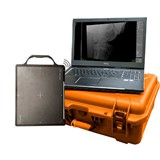However, Dr James Siow of Australia's National Institute of Integrative Medicine (NIIM) says both governments and the healthcare profession have been slow to respond to the rise in chronic ill health due to low-level, unavoidable chemical contamination in air, water, food and the modern living environment.
"Scientists first sounded the alarm about the increase in contamination of our environment and ourselves in the 1980s," Dr Siow said.
"Today there is a worldwide scientific consensus on the critical importance of global pollution, its effects on human health and on the necessity to make scientists, doctors and the public aware of the vital importance of prevention.
"There is no doubt at all that pollution is now a global issue – and that nobody is spared, not even newborn babies.
"One US study found 232 industrial chemicals and pollutants, including known carcinogens and complex mixtures, in the (umbilical) cord blood of newborns. This means that children are coming into the world already polluted with things that could kill them."
Dr Siow said even more troubling is pollution has now been found to affect at least three generations. The genetic damage caused to grandparents by common toxins can go on to affect their grandchildren. The rise in autism spectrum disorders is considered by many scientists one possible outcome of this process.
"The problem is that we are still using many of these toxic substances," he said.
"For example we have long known that mercury causes nerve and brain damage in young children, and it has been banned from dental use in Sweden for over a decade. However in Australia it is still being used."
Dr Siow said governments have been aware of the worst toxicants — things like mercury, lead, PCBs, organochlorine and organophosphate pesticides and endocrine disruptors — for decades, but have still not acted fully to end exposure of the population to these substances.
"Our slowness in responding to the scientific evidence is hard to explain," he said.
Dr Siow concedes to protect society fully would involve the withdrawal from the market of thousands of products, including cosmetics and personal care products, food products and packaging, furnishings and bedding, household cleaning agents and pesticides — involving a cost which would be high.
"But the cost of exposing society to these things is higher still," he said.
"Healthcare costs due to degenerative diseases are now crippling the US Obama government. The economic losses from sickness caused by chronic chemical exposure are rising in all societies."
He said at the same time, we need to train doctors and healthcare workers to better diagnose the symptoms of chronic chemical poisoning:
"Our doctors are no longer trained to look for these ecotoxic effects when they see patients; toxicology is now largely omitted from most medical courses," Dr Siow said.
"As a result, many of these problems are going undiagnosed and consequently the scale of the problem is unrecognised by the health authorities.
NIIM has initiated a centre of clinical toxicology, which Dr Siow co-directs with Prof Robert Allan.
"We are planning postgraduate courses that we hope will help interested doctors come aboard and assist us in planning for improved community health by addressing these toxicity issues," he said.
"We need to educate more doctors to do simple, low-cost tests like hair and urine analysis to find out what is going on.
"In cases of chronic illnesses for which orthodox approaches have come to their limits of effectiveness, the influence of environmental toxicity on human health should be considered and clinically investigated.
"A major concern is the mixture of chemicals to which we are now subjected from all quarters — an issue which the Council of the European Union warned about several years ago. Individual chemicals may not be in harmful doses – but the combined effect of many toxic substances from many sources can be just as bad."
Dr Siow argues there is much that can be done to reduce the burden of toxicity in the community "but we just aren't making use of what we know to prevent disease".
CleanUp 2013 was hosted by the CRC for Contamination Assessment and Remediation of the Environment (CRC CARE).










-160x160-state_article-rel-cat.png)













